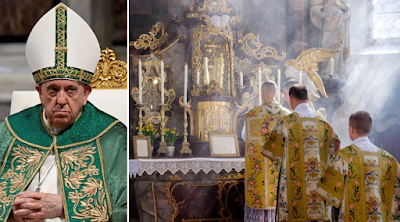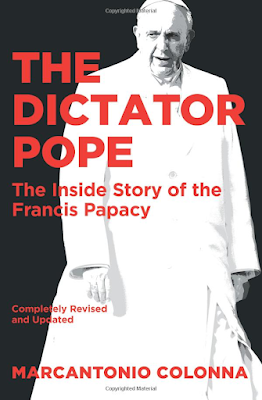To comment please open your gmail account or use my email address, fb Messenger or Twitter.
 |
| Self-explanatory |
False obedience is a concept familiar to any Catholic with an ounce of knowledge of the Faith. It consists, in essence, in obeying man rather than God.
For example, it's false obedience to fall in line with apostate bishops who airily dismiss the Third Commandment of God and dispense their flock from the obligation to assist at Mass on Sunday for fear of the flu, as in the Covid shamdemic plandemic scamdemic.
"Subversive obedience" is something else altogether. For Rad Trad Latin Massgoers - even for ordinary Latin Massgoers if there are such animals, which in New Zealand at least is unlikely - would seem to have a lot going for it.
Father Dwight Longenecker is an American convert from Anglicanism, once a minister and now a Catholic priest, who studied theology at Oxford and spent most of his life in England before returning to the US, to the Bible belt. He's editor of a best-selling book of English conversion stories, The Path to Rome– Modern Journeys to the Catholic Faith.
Fr Longenecker suggests, as his countryman Cardinal Arthur Roche continues the calamity called down upon the Church by +Jorge Bergoglio, that "subversive obedience" is the way forward for faithful, traditional Catholics who love the Mass of Ages.
 |
| Fr Dwight Longenecker |
Quo Vadis Traditionalists?
Allow me to reflect on something called “subversive obedience”. When I was a student at a certain Protestant fundamentalist university in the 1970s we were obliged to observe a fairly strict dress code. Blue jeans were prohibited. Men had to wear a button-down collared shirt with a tie to morning classes. You can guess what happened.
I and my fellow art students purchased corduroy Levis. Pants that were cut just, and worn just, like jeans. We got big plaid lumberjack flannel button down shirts with collars and finished off our outfit with outrageous silk ties from the 1940s salvaged from the Goodwill store. It was quite a flamboyant, creative outfit that flaunted the dress code while observing the letter of the law.
This happens whenever authorities seek to impose their will by stupid, oppressive legislation. I remember one boarding school in England that required the boys to wear khaki pants and the school blazer with school tie. The little boys colluded with the older boys and swapped uniforms so all across campus you would see strapping eighteen year old rugby players crammed into khaki pants and a blazer sized for a ten year old. Likewise the little boys traipsed around the school in hugely baggy pants with the cuffs rolled up and jackets with massive shoulders and sleeves rolled up to the elbows.
Granted that this admirable behavior is somewhat adolescent, but it's what people are driven to by narrow-minded legalists who wish to impose their own ideology and preferences on others for some misguided idea that uniformity is the same thing as unity.
So with this in mind, what will be the response of those Catholics who are devoted to the Traditional Latin Mass given Rome’s latest round of restrictions? Several things: Some will migrate to the SSPX. Others will seek out other forms of reverent, traditional Catholic worship– an Ordinariate parish, a Byzantine parish or a Novus Ordo that is celebrated in a traditional manner.
Others, who are more hard line, will practice subversive obedience. “We can’t have the Latin Mass in the parish church? OK. We’ll move it to the parish fellowship hall, the gym or the Rectory chapel. In fact, what we’re doing is raising the money to build a Latin Mass chapel on the church campus. We’ll worship there instead of the parish church.”
Then, if the legalist clericalists respond in due form, another rule will come out that bans the Traditional Latin Mass from any building on the parish church property. “OK.” respond the traditionalists, “We will worship on Sunday elsewhere. The Episcopalians, the Methodists or the Lutherans have offered us hospitality. The local TLM will be held in a Protestant Church.”
“But you can’t advertise it in your church bulletin!” cry the legalistic clericalists. “Never mind. We have our own email lists and we advertise with posters on the church door.” “But you can’t advertise with posters on the church door!” “Right. Got it. We’ll hand out flyers at church.” and most annoyingly (from the point of view of the clericalists) this will largely be done by the laity who are not hindered by something so cumbersome as a vow of obedience to their bishop.
You see how it goes.
What complicates this problem even further–and something which the Englishman Roche doesn’t seem to understand at all is the entrepreneurial spirit of American conservative Catholicism. I lived in England and know both the English Catholic Church and the Anglican Church very well. The English Catholics haven’t got an ounce of entrepreneurial spirit, and don’t understand this aspect of American religion. From the beginning of America as a country we’ve had separation of church and state and this has meant “If you want a church you have to pay for it yourself. The King isn’t going to fund it. Neither is Lord Balloon or Archbishop Redcoat. Get on and do it yourself.”
While the autocrats, bureaucrats, aristocrats and any other “crat” in Europe may dislike this independent spirit, they will have to get used to it. While the experts may lament the interference of hoi polloi they need to accept it, and in Catholic terms, if the laity get involved and get busy and keep the faith and promote the faith and evangelize well, isn’t that what the Second Vatican Council was all about? The present oppressive regime in the Vatican seems to be attempting to close the stable doors after the horse has bolted.
All the lovely talk about empowering the laity to do their job is just fine until the laity start actually doing their job of keeping the faith, teaching the faith to their children and evangelizing. I’ve often wondered, for instance, what happens when some modernist bishop who is all enthusiastic about lay people administering a parish finds that the lay people who have taken over are actually traditionalists. Whoops. We want lay people to be in charge–but not THOSE lay people!
So this American laity-led entrepreneurial spirit is one thing to cope with. The other thing Cardinal Roche and his politburo need to understand is that the traditionalists have invested big time in their enterprise. The folks in the Vatican should take some time to stop and understand what, exactly, they are suppressing. To do so, let them view this video about the SSPX community of St Mary’s in Kansas.
In New Zealand one has only to visit St Anthony's SSPX church and school (Years 1-13) in Gonville, Whanganui, to see what Fr Longenecker is talking about. And the February 2023 update on the St Mary's Kansas video (above) shows the installation of a magnificent statue of the Immaculata above the vastly impressive (especially to New Zealand viewers, accustomed as they are to new churches looking like private homes with a pointy bit on top and a drive-through porch) which is still under construction.
The traditionalist community have not only invested large sums of money in their project - more importantly they are invested emotionally and relationally. In other words, their families are invested. Those who are committed to the traditionalist movement in the Catholic Church have invested their lives and the lives of their children in something they passionately believe and sacrifice for.
Try suppressing that! The Vatican needs to realize that this is not a problem that will go away with legalistic restrictions from a meddling cardinal far away in Rome.
Finally, what would my advice be? I have outlined my advice to traditionalists in this blog post (redacted here):
I hope the priests and people who are devoted to the Traditional Latin Mass might decide to follow the way of “subversive obedience.”
Celebrating the Novus Ordo Mass does not mean everyone holding hands and singing Kumbayah.
 |
| Father Fabulous and Sister Sandals in disguise |
Remember the flexibility of the Novus Ordo is a two way street. Sure, Sister Sandals and Father Fabulous might celebrate with sock puppets giving the homily and singing happy clappy folk music, but Father Biretta can also use the flexibility to his advantage.
He may celebrate the Novus Ordo in Latin. Ad Orientem. He can use all the Gregorian chant he likes. Wear fine vestments. Have well trained altar boys. Include some of the “extras” like the prayers at the altar, the Prayer to St Michael etc. Administer communion to the faithful kneeling and on the tongue. Encourage traditional devotions in Latin.
To summarize, I advise folks to celebrate the Novus Ordo in the most traditional way possible. Allow the Traditional Latin Mass to inform the celebration of the Novus Ordo.
Unfortunately, Kiwi priests may well encounter stiff opposition from parishioners imbued with the modernist template of years of the "we do things differently here (i.e. New Zealand") mindset of our bishops.
Ask yourselves what is most important. Is it truly the Latin language and the extraordinary form of the Mass that is so vital or is it that you value reverence, beauty and tradition? These are all possible within a reverent and traditional celebration of the Novus Ordo.
Er, tradition? Not so much. Fr Longenecker, as an ex-Anglican minister, is traditionally-minded but not schooled in the rich mysteries of the texts of the Old Mass, the usus antiquior, which are not to be found in the Novus Ordo:
The classical liturgy begins, in a sense, with the inner man and works from there to the outer man. This is why it is a harder, more demanding way, a more deeply transformative way—one that is, for that very reason, more full of joy and more productive of fierce devotion. This liturgy demands of us that we be formed and educated, otherwise we can make no sense of it. It prompts the development of new faculties of seeing and hearing; it requires an exodus from our surroundings of pop culture and intellectual fashion; it calls us to a strange land, like Abram being summoned from Ur to Canaan. Latin is the intuitive symbol of this stripping of oneself and donning a new garment, fit for standing in the presence of the Lord.
When Latin was de facto abolished, a potent and efficacious sign of the transcendence of God (the object of worship), of man (the subject of worship), and of the activity of worship itself (the mediating sacrifice), was lost, with immensely damaging consequences.https://www.newliturgicalmovement.org/2015/07/formed-in-spirit-and-power-of.html#.Y_2kQXZBzgs
- Collect, Tuesday within the first week of Lent




















